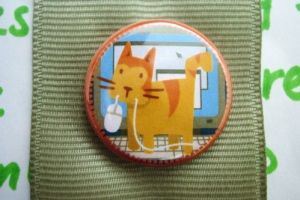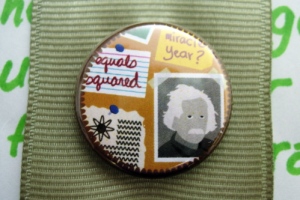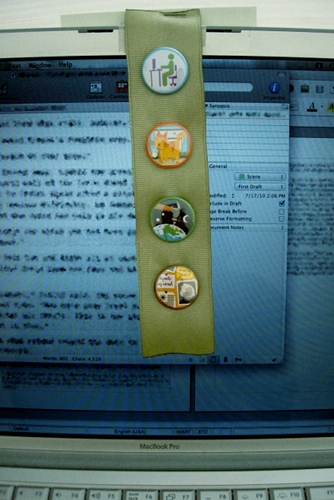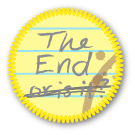You all know that Em is awesome because she is the Merit Badger, and Merit Badgers = Awesome! And you can tell that she is supportive from all the digital merit badges she generously distributes! She has also helped me to be brave, and that is awesome, too. Let me tell you a story about a super villain, a shark, a badger, and me.
It’s Not the Failwhale You Have to Watch Out For
Once upon a time on Twitter, there was an aspiring author. Well, upon lots of times on Twitter there were aspiring authors, but this time it was me. I had gotten myself on to Twitter, and I was trying to figure out how it worked. How to be a writer on Twitter.
Twitter is different from other online adventures I’ve had. It’s more immediate and real-time, and it’s almost eerily easy to talk to people on Twitter: just @ mention them, and there you are. But just because it is easy to do something technologically, doesn’t mean it’s easy emotionally to do it. After all, there are rules to these things! Social rules! And I didn’t know any of them.
Fortunately, I did know a certain badger. Though for just a moment there I wasn’t so sure about the “fortunately” part.
Into the Water
One day, not too long after my first tweet, I was talking with @meritblog on the Twitter. The topic of agents on Twitter somehow came up. (Em. How did that happen?)
I told Em that there was a certain sharky agent whose name I was far too shy to even type into the Twitter. Not @ mention! Just type it at all.
If Em laughed at me, she didn’t do it on Twitter. She did, however, go get Vordak. On Twitter.
I don’t really remember the particulars about the conversation that ensued. It’s somewhere deep in the Twitter stream at this point. But here is the general concept of playing with @Vordak on Twitter:
Vordak is a super villain! Oh no! And he has a mind control ray! And minions! And bears ridiculous head gear! Oh my!
Pretty schoolyard, and lots of fun. A super villain on Twitter. Who knew?
Turns out, Vordak is not the only super villain on Twitter. Not only is @Janet_Reid a killer shark with superpowers, she also faces off with Vordak from time to time. Jumping in with Vodak is an excellent way to end up in shark-infested waters. [1] Isn’t that right, Em?
It was the scariest Twitter conversation I have ever had. It may be the scariest I will ever have. Can’t really imagine what would jolt me more than all of a sudden talking with Janet Reid when I hadn’t meant to at all and I didn’t even know how to Twitter! Oh my!
And guess what? It was fine. Tweeting @ Janet Reid was fine. [2] We had fun taunting Vordak, he had fun menacing us. It was all very juvenile and fantastic. And I survived.
Em was there the whole time: warning me about the mind control ray, cluing me in about how to play the game [3], insisting that I engage with Janet Reid. She helped me to be brave.
Being brave meant that when I entered a contest at Janet Reid’s blog, and messed up my user name spectacularly, I was able to ask on Twitter if I could try again. (Her answer: Sure.) I also felt brave enough to @ mention @Janet_Reid when I tweeted recently about why I tweet. [4] I was brave enough to do these things because Em pushed me into the water with the Shark. Badgers, I tell you.
Calm Seas Ahead
Now, this isn’t to say I feel the need to be chatty with agents all the time. Reading agent blogs compelled me on to the internet, but now that I’m here, my goals for blogging and tweeting have morphed a bit. I get so much out of connecting with writers who are at similar places in their journeys to mine. That’s what I want for now. At some point, though (when the MS is much closer to polished and ready), I will want to talk with agents on Twitter, and at conferences, and so on.
Is that still a scary prospect for me? Yeah. A little. Of course it is: this is my career we’re talking about. But is it terrifying? No, not at all. Just normal jitters. I survived jumping in with the Shark and with Vordak on Twitter, you see. After that, otherwise frightening things just don’t have the same bite.
Thank you, Em.
Also, thank you, Em, for this:
OMG! My excitement started with this in the mail box:

Badger Sticker by Merit Badger
Then there were squeaky noises! (Okay, they were from me. I squeaked.)
I knew Em sent a package. There was a reason that “check the mail” was my afternoon writing break all week. And yesterday, there it was! My prize!
I’m pretty sure this is a prize for realizing that I’m goofing off on the internet, then doing it anyway. To read the fabulous haiku I wrote at the start of all this, you must go over to the Merit Badger blog posthaste! It’s there, in the comments of the post about the Getting the Hell off the Internet and Getting Some Writing Done for a Change Escaping the Web Badge.
Keep in mind that I am resolute in my belief that Twitter is a season word.

Badger Scout Sash and Badges by Merit Badger
When Em told me I won the How to Get Sucked into Silly Things on the Internet Even Though You Know Better Contest, she asked for my three favorite badges, earned yet or not. I told her
Worldbuilding,
Feline “Assistance”, and
BICHOK.
I also mentioned that it was a toss-up for me between the
Research Badge and the BICHOK Badge, but that I felt worldbuilding implied research, and I really wanted that BICHOK badge!
When I pulled a tiny sash of real Badger Scout merit badges out of the package, I blinked at it for a moment. Partly it was because I could not believe the sheer awesomeness of holding actual Badger Scout merit badges in my hand (because they belong on the internet). But it was also because there were four badges! Four badges!
I didn’t know exactly what Em was going to send, but I guessed it was some kind of art object involving the badges.
Three badges. And there were four! The Research Badge was a special bonus badge in congratulations for
finishing my first draft. So much yay!
Thank you, Em. I love them all.
The photo shows the order in which Em put them on the sash. I love it because it tells a story of my writing, bottom to top, in abbreviated form.
How to Write:
- Research
- Worldbuild
- Grab cat
- Write!
Okay, okay, so there’s outlining and character creation and so on somewhere along the line, too. But I’m not sure any of that is as important as step 3. And I’m certain that step 4 is the most important of all. Sitting down to write — even if you don’t want to — is key: Butt In Chair, Hands On Keyboard, BICHOK!
Here are some photos of the badges up close (they are tiny pin-back buttons, and shiny in more sense than one):

BICHOK Badger Scout Badge by Merit Badger

Feline "Assistance" Badger Scout Badge by Merit Badger

Worldbuilding Badger Scout Badge by Merit Badger

Research Badger Scout Badge by Merit Badger
And here I have placed the sash on my computer, where it most likely belongs (though that does make it challenging to keep writing. Hmmm.):

Crashy with Badger Scout Badges by Merit Badger
Again, thank you so much, Em! These Badger Scout merit badges mean so much to me! I love them!
Dip a toe into the footnotes:
1: Especially if Vordak is gleefully pushing you in that direction. Which he was. I’m on to you, Vordak!
2: It’s okay to admit, down here in the footnotes, that Janet Reid is actually very nice? She is. Here’s an example of her niceness: The Query Shark. (No, really. I mean it. Think about it.) I was just feeling shy and out of my element, that’s all.
3: I didn’t realize about the book at first (Vordak the Incomprehensible: How to Grow Up and Rule the World by Vordak T. Incomprehensible. It’s MG humor. I’ve pre-ordered. Can’t wait!). Before I googled, I’d seen Vordak around the Twitter, but I didn’t know what was up with him. I thought he might be a comedian making a name for himself. I didn’t know how rough he would play. Now I know that not only is he a super villain, he’s also an author.
4: Wanna read about it in more than 140 characters? Right here.














































